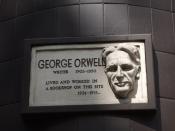Several conflicting frames of mind have played defining roles in shaping humanity throughout the twentieth century. Vision of a bright future held by humanity was taken advantage of by the promise of a better life through sacrifice of individuality to the state. In the novels 1984 by George Orwell and Fahrenheit 451 by Ray Bradbury, clear opposition to these subtle barriers was voiced. These books established the atmosphere and seductiveness of "utopia" and fear of the consequences of acting in the non-prescribed way through character development. A single character is alienated because of his inability to conform. The characters struggle to hide this fact from the state's relentless supervision. This struggle leads them to eventual conflict with some hand of the state, which serves as the author's voice presenting the reader with the 'absurdity' of the principles on which the society is based. The similar fear of the state's abuse of power and technology at the expense of human individuality present within these novels speaks to the relevance of these novels within their historical context and their usefulness for awakening people to the horrendous consequences of their ignorance.
In these novels the main characters are, or become, unable to conform to the society's standards. These characters represent the authors' view of the 'utopia' as they see it with the veil of ignorance removed. In 1984, we start out with a character, Winston, who is constantly observing the ironies of the world about him. Through his job at the ministry of truth, he becomes a hand of the state, creating fiction to support its endeavors, "Comrade Ogilvy, unimagined an hour ago, was now a fact ... he would exist just as authentically ... as Charlemagne and Julius Caesar." (1984, 54) As the book progresses he becomes more aware of...


